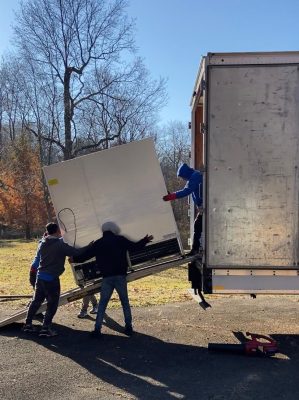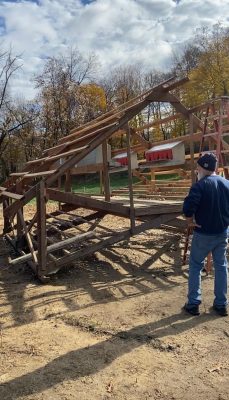Local Organic Farm Forced to Relocate; Explores Two New Locations
News Based on facts, either observed and verified directly by the reporter, or reported and verified from knowledgeable sources.

On a cold night in November, a handful of volunteers started to dismantle greenhouses and mobile chicken coops owned by Fable Farm in Yorktown. Night is the best time to move 200 hens and a few belligerent roosters because their poor eyesight makes them less resistant.
Last spring, after running Fable Farm for eight successful years, the rent doubled on the 17 acres of leased land on Kitchawan Road, forcing the farm’s founder, Tom Deacon, his wife Kris and their three young children, to look elsewhere to continue the operation.
Farm equipment and mobile structures were moved last month and are being temporarily stored on nearby property.
Fable Farm has been a thriving organic operation known for its fresh produce, farm-to-table greenhouse dinners and classes for children. Creative marketing assured the farm’s survival during the pandemic and their continued success. Its market featured farm-fresh produce and goods grown by local farms, bakers and small businesses in the area.
“The farm was incredibly successful at selling locally-grown organic produce,” Deacon said. “We consistently sold out of pasture-raised eggs and heirloom tomatoes. On occasion people may be turned off by the price tag, but once they taste the higher quality and get a chance to meet the farmers they are supporting, they tend to come back. That allows our team to go back out into the community and support other local small businesses.”
Deacon said there were other reasons they had to relocate. The Westchester County Health Department required a new water meter and filtration system, neither of which the landlord was willing to install, he said.
The hardship of little or no land security and affordability has become all too common for small farmers across the U.S. Paradoxically, as the demand for locally grown organic produce has skyrocketed, small to medium organic farms are struggling to exist. (According to the Organic Trade Association, organic food sales in the U.S. set a record last year of $61.7 billion, up 4.3 percent.)
The biggest obstacles for farmers in the Hudson Valley, and especially in Westchester and Putnam counties, is securing land that would otherwise be sold for a great profit to potential developers whose offers are welcomed by many municipalities seeking greater tax revenue.
“The trend in the last few years of greater land unaffordability was fueled by COVID,” said Jack Hornickel, a staff attorney for the Food & Farm Business Law Clinic at Pace University in Pleasantville who has been advising Deacon. “It was an outward urban migration and because land values are driven by a free market, there are higher more profitable uses for the land than farming.”
Hornickel added that land in Westchester is desirable for residential developments because of the proximity to New York City.
To secure property to grow crops and raise livestock, farmers have to begin the long process of obtaining special permits and approvals required by towns, a process which can take a year or more.
Deacon was able to find two new potential properties for Fable Farm, each within a few miles of the former location. One is in the Town of New Castle near Route 134; the other is land in both Yorktown and Putnam Valley. Deacon wants to keep his options open and he has communicated with each town his intentions to operate a farm on one of the proposed properties.
The Yorktown/Putnam Valley property is 31 acres and the New Castle parcel is a little more than 25 acres. Deacon said the plan for the New Castle site includes a market, a pasture for chickens and educational trails.
“This is all pending town approval,” he said. “I am working with an attorney, architect and engineer now and we are putting together a site plan which will be submitted with our special use permit application.”
New Castle Building Inspector Tom DePole said Fable Farm has spoken to his department about the property, but a formal application has yet to be submitted.
“They would have to apply for a special use permit based on zoning codes for a variance to operate a farm in a residential district,” DePole said. “Ultimately it’s up to the Town Board and the public to grant a special use permit.”
DePole said apart from the New Castle property, Fable Farm has inquired about a tent permit that would allow them to temporarily store farm equipment and mobile structures.
Opposition in Putnam Valley

In October, Deacon appeared before the Putnam Valley Planning Board to present plans before beginning the application process. It was at that meeting that residents raised some issues.
“They had several concerns, such as the use of pesticides on the farm, which are unfounded,” said Deacon. “I started Fable back in 2015 because I was concerned about the toxic chemicals in the food system.”
Hornickel explained that its common for farmers to face conflict when they appear before planning and zoning boards that review permit applications or site plans.
“Facing pushback is largely because of certain conflicts between state and local government laws,” Hornickel said. “In New York State the important concept of home rule says the town government has control in its jurisdiction, which is important for self-determination. But home rule is often at odds with New York State law that promotes agriculture in all forms, including marketing, events on the farm, agritourism and food production.”
Two weeks ago, the Putnam Valley Zoning Board of Appeals unanimously approved Fable Farm to harvest and sell produce on the proposed site. But Deacon still needs a special use permit to host educational classes, workshops and other activities.
According to Yorktown Director of Planning John Tegeder, for the part of the property that is in Yorktown, there has been no formal application submitted by Fable Farm to the town.
“An application for a special land use permit would be reviewed by the zoning board for their approval, along with site plans showing buildings and setbacks,” Tegeder said. “The zoning board then refers the application to the Planning Board. Typically, an application of this nature would have a public hearing.”
In the past, Westchester farms struggling to stay solvent have been acquired by the county, allowing them to continue to operate while offering educational and community services. In 1967, Westchester County purchased Muscoot Farm in Somers, and in 2003 the county purchased the 180-acre Hilltop Hanover Farm in Yorktown and has since converted a portion of the property to a horticultural educational center.
In 2016, the popular 172-acre Stuart’s Fruit Farm in Somers was protected from future development by the Westchester Land Trust, which purchased the property development rights and oversees a conservation easement.
Earlier this year, a conservation easement was established with Ryder Farm in the Town of Southeast, Putnam County, that will permanently protect the 128-acre farm from future development and ensure it’s used for agriculture in perpetuity. All of these farms were owned by families whose successive generations inherited the land.
Deacon, who has yet to own land he can farm, realizes that the local permitting process might take too long to start preparing for the next growing season.
“I am not too optimistic about the spring,” he said. “We are looking into alternative options and temporary sites at the moment.”
Currently the plan is to fully open the farm in 2025, wherever it may be.
Meanwhile, several letters of support have been received from residents in New Castle, and from Assemblywoman Levenberg (D-Ossining) and state Sen. Peter Harckham (D-Lewisboro). A special Fable Farm GoFundMe Campaign was started in October and has raised nearly $19,000 as of Thursday, with a goal of reaching $350,000.
The raised funds would pay for relocation costs, permits and greenhouse reconstruction, moving equipment and paying existing suppliers and vendors. When the farm finally relocates, the money will be used to create a parking lot, purchase an expanded cold storage room, a redesigned market, an outdoor seating area, driveway light posts and educational farm trail signage.
Hornickel said he often advises farmers on social community strategy.
“We encourage farmers to be part of the neighborhood and to communicate how farms bring value to the community by growing and selling food,” he said. “Local farmers create a reliable food source to more people while tending to the environment.”
Residents can submit letters of support at info@fablefoods.com.
To contribute through GoFundme, visit https://www.gofundme.com/f/lets-build-an-all-new-farm-and-food-hub?member=29405589&utm_campaign=p_lico+share-sheet&utm_medium=copy_link&utm_source=customer.

Abby is a seasoned journalist who has been covering news and feature stories in the region for decades. Since The Examiner’s launch in 2007, she has reported extensively on a broad range of community issues. Read more from Abby’s editor-author bio here. Read Abbys’s archived work here: https://www.theexaminernews.com/author/ab-lub2019/
